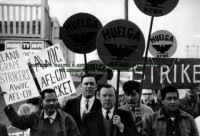 New Orleans An axiom of organizing in whatever form or fashion it occurs has always been that what matters is what you do tomorrow, not yesterday. This is particularly true for membership organizations where any accomplishment exponentially increases the expectation that the organization needs to produce even more today and tomorrow to meet the rising demands of its members. Given the constant sense of immediacy and even urgency in the work, it should be no surprise that history seems a fragile, ephemeral luxury for many, sometimes masking a paint job and a new sign out front as if it were a reinvention. Nonetheless to the degree the work is important, practitioners are obligated to feel the weight in order to extend current practice and potential farther and deeper than its been.
New Orleans An axiom of organizing in whatever form or fashion it occurs has always been that what matters is what you do tomorrow, not yesterday. This is particularly true for membership organizations where any accomplishment exponentially increases the expectation that the organization needs to produce even more today and tomorrow to meet the rising demands of its members. Given the constant sense of immediacy and even urgency in the work, it should be no surprise that history seems a fragile, ephemeral luxury for many, sometimes masking a paint job and a new sign out front as if it were a reinvention. Nonetheless to the degree the work is important, practitioners are obligated to feel the weight in order to extend current practice and potential farther and deeper than its been.
In Scotland recently, I was surprised to hear a talented, whip smart, and experienced ACORN organizer ask, “Who was Saul Alinsky?” I was taken back for a minute. I recalled a similar experience some years ago when an even more experienced union organizer for Local 880 in a joint training and planning meeting with Local 100, asked “Who was Cesear Chavez?,” which was even more surprising given that there was an emerging movement in many parts of the country to create a holiday in his name. For every Martin Luther King or Gandhi, there are hundreds of George Wiley’s, Arthur C. Townley’s, and Wyndham Mortimer’s who are unknown to all. All that is on us, and we do the best job we can. In our training programs people read Chavez on dues, Warren Haggstrom on leadership styles, Nicholas von Hoffman on power, and any number of other critical, foundational pieces that guide and influence the work.
Does it matter? Frankly, I’m not sure that it does in the day to day of the work. But for me and others who believe that organizing is part of a continuous historical tradition of struggle for social change, justice, and empowerment, it’s fundamental not only for how history shapes the very meaning and practice of the work, but also just because it’s important to carry the flame forward.
Of course there has been a continuous stream of books recounting or revising the Chavez work, but the last major treatment of Wiley was 1981. Thanks to rightwing usurpation, Alinsky has had a slight revival, although the last serious work on him was in 1992. I was surprised to see that a poetic treatment of Alinsky (Be Thou a Man) and a play (The Love Song of Saul Alinksy) had been produced in recent years and of course Von Hoffman himself produced a recent memoir to try to ride the wave of hateration. Mike Miller, a longtime community organizer based in San Francisco, and Aaron Schurtz, a UW-Milwaukee professor, are editing a “readings” volume coming out this fall called, People Power: The Community Organizing Tradition of Saul Alinsky that Social Policy (www.socialpolicy.org) is excerpting in our fall issue, which seeks to address this question by assembling various pieces following a number of community organizing strains over the last 40 years.
Decades ago ACORN working with Seth Borgos and Madeline Adamson produced a series of displays on organizing history with support from the National Endowment of the Humanities, but who knows where that might be now or if it even exists anymore. In Little Rock, ACORN International, Local 100 United Labor Unions, and KABF are working to start a small, amateur “ACORN Museum” in our building there to do our part.
Reading UALR political scientist and historian, John A. Kirk’s, history of the work of SNCC in Arkansas, I asked him how many people he thought had read the book or cared anymore. His answer was quick and firm. In essence he replied, it didn’t matter. The important thing was making sure there was a clear and accurate record of the history.
There will be people who will look, and they will need to find the answers, and for them history and tradition will have value and instruct and the rewards will multiply in future sweat and struggle. In the meantime the rest of us who care about the work, about change, and about people, have to keep the flame flickering, so that others can find it through the dark of the future.